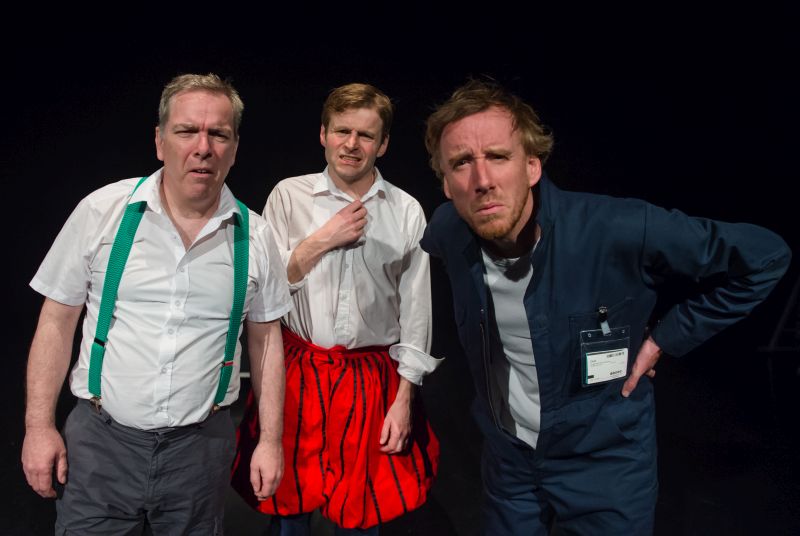 An Englishman, an Irishman, and a Scotsman: it’s a good premise, one we’re all familiar with, and certainly holds the potential for not only a good dose of laughs, but also a puerile potential for political undertones. The Joke, presented by Will Adamsdale and Fuel Theatre at Camden People’s Theatre, sets itself up in exactly this fashion, but unfortunately on many levels falls short of its own expectations.
An Englishman, an Irishman, and a Scotsman: it’s a good premise, one we’re all familiar with, and certainly holds the potential for not only a good dose of laughs, but also a puerile potential for political undertones. The Joke, presented by Will Adamsdale and Fuel Theatre at Camden People’s Theatre, sets itself up in exactly this fashion, but unfortunately on many levels falls short of its own expectations.
We begin by sitting, collectively sharing the experience of staring into an empty space, before eventually the silence is broken by seemingly one of our own. A man tucked away three rows back begins to whisper to an audience member in front, to ask what’s going on. The premise feels obvious and it’s quite awkward, deliberately so, before breaking down. He stands, proclaiming his need to leave, as ‘nothing is going to happen,’ only to find that the door to the exit is now locked. Thus the play ensues, and two other characters are introduced (including CPT’s own artistic Director and erstwhile Cartoon de Salvo performer Brian Logan), both equally confused about their motives for being here. Eventually, the trio whittle down the possibilities, concluding rather absurdly that they must be trapped in a joke, and in order to escape they must set about presenting this joke in its entirety. Farce follows with far too numerous retellings and re-imaginings of the Man Overboard joke, concerning an English Captain, an Irish deck-scrubber, a Scotsman – who might be the lookout, I’m not too sure – and a Boy/Buoy. I’m sure you’ve heard it.
The main problem lies in an underdeveloped plot, and the lack of any clear resolution. Indeed, the play rather fizzles out, seemingly having run out of ideas. There is no indication as to why all of a sudden they are able to escape the joke: it is overlooked. Even more frustratingly, the perfect closure presents itself. As they share their last remaining tic-tacs, the following quip is heard: ‘We’ve got no tic-tacs, and you could say, no tac-tics.’ The trio collectively laugh, in a moment which celebrates the simplicity of a joke’s ability to bring laughter from the most unexpected of places. They succeeded on their voyage to discover ‘why we tell jokes’. I could almost see the door swinging open, proclaiming their chance discovery in a moment of despair. But it remained firmly shut.
There were simple problems with pace and comic timing. Cheap gags reigned supreme, which is fine, but it all felt woolly. Comedy demands precision, there was too much uncontrolled mayhem here. Each performer took it in turn to lead gag after gag, allowing no time to establish a rapport between themselves. The play makes reference to the Marx Brothers and the contrast felt telling. Chico, Harpo, Groucho, Gummo and Zeppo each developed very distinct personas, complementing each other in highly situational-based comedy. Here the situation, however abstract, was present, but the three performers didn’t utilise their complementing traits, and this stunted the comedic effect.
The play isn’t without merits; Lloyd Hutchinson makes an amiable Irishman, the butt of many a joke but by far the most accomplished in his comedic delivery. His timing is precise and raises genuine laughs and he balanced the tone well rendering the melodramatic elements of the plot less garish.
Comedy is tricky – and even more so when there is an attempt to deconstruct it. Here, it feels like too many elements are in the mix, and the result lacks the polish and wit the concept deserves. There is certainly potential in the subject matter and these are three accomplished performers in their own right. A bit more exploration may well unearth a more cohesive dialogue to carry the play forward.

